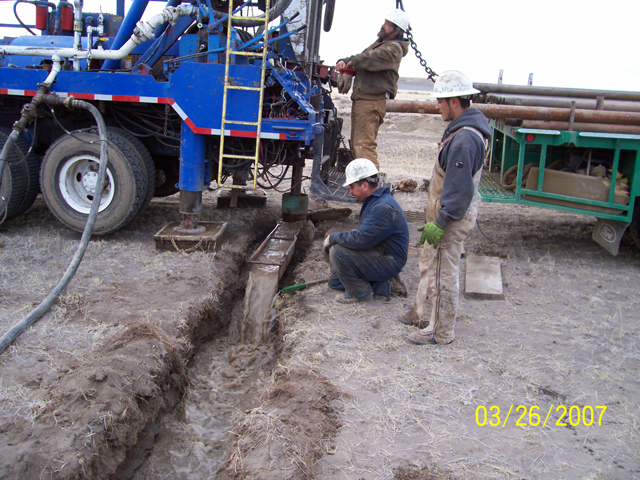South Dakota water regulators move to tighten regulations for in situ leach mining
Revisions are in response to Powertech's plans to mine in Black Hills
Posted March 13, 2008
Rapid City Journal
Rapid City, South Dakota
March 13, 2008
Hearing on uranium-related permits coming to Rapid City
By Kevin Woster, Journal staff
Black Hills residents will have a chance to comment next month in Rapid City on impending uranium development plans in western South Dakota and how it might hurt water resources.
The state Water Management Board held a hearing Wednesday on the revised rules that will be required for uranium mining to commence. Opponents of the uranium-mining plan say the final form of the rules could be crucial to protecting water resources from damage by mining operations.
 |
| Bruce Ellison of Rapid City (Photo by Joe Kafka, Associated Press) |
Initially, state Department of Enviornment and Natural Resources officials expected the Water Management Board to act on the rules revision Wednesday. But the board decided to continue the hearing to April 2 and 3 in Rapid City to allow for more public comments.
Bill Markley, administrator of DENR's state groundwater quality program, said new comments and questions Wednesday from the public persuaded the board to continue the meeting and move it west.
"The board felt that since they were continuing the hearing, they wanted to be out closer to where the mining would take place," Markley said.
That was "wonderful news" to Rapid City lawyer Bruce Ellison, who commented to the board Wednesday, expressing his fear that uranium development could damage both underground and surface water supplies in western South Dakota. Ellison said he hopes citizens who are worried about uranium mining will take those concerns to the meeting April 2 and 3.
"This is such an important issue for our surface water and groundwater," Ellison said. "Hopefully, a lot of West River people will think about our water resources and how important they are and come voice their opinions to the Water Management Board."
Powertech Uranium Corp. of Denver is exploring for uranium in Fall River County, with plans eventually to mine the metal through an in situ leach mining technique that recovers uranium through an injection process. A solution is injected into the ground to capture uranium, then recovered in a well system.
Those operations, and others like it possible from other companies, have the potential to degrade water quality in the developed area, Ellison said.
In addition, the geologic formation containing uranium reaches around the Black Hills, creating potential for mining operations in the Rapid City, Sturgis and other areas, Ellison said. That's why it's essential that the water board come to the Black Hills to hear public concerns, he said.
 |
| Powertech rotary drilling rig at the Dewey Burdock site (Photo: Powertech Uranium Corp.) |
Hydrology studies of the Black Hills show it clearly to be a "major water recharge area for the northern Great Plains," Ellison said.
"Anything that potentially degrades that water is something that should be of concern to everyone who lives and works here, whether they work on the land or off the land," he said.
Markley said a system of state and federal permits and regulations are designed to limit water impacts related to uranium mining. The state Board of Minerals and Environment already has rules in place to regulate in situ mining and the Water Management Board is working on revising its rules for well permits that will be needed for the mining operations.
The rules must be in place for boards before Powertech and other companies can begin applying for actual mining permits. Those Water Management Board rules have been in place since 1987, and need revision, Markley said.
"We feel that by doing this revision, we're bringing them (rules) up to speed ... and trying to be more protective than what we knew about in 1987," he said.
The revised rules will strengthen groundwater monitoring requirements to assure that groundwater isn't being affected beyond the mining area, Markley said. And when mining is finished, regulations would require the mining companies to restore the groundwater quality that existed before mining came, or come as close to that conditions as possible.
Ellison worries about how well the water can be restored and how far beyond the mine area interconnected water resources might be affected.
"No in situ mining company has ever been able to return their wastewater, their so-called restored water, to its baseline," Ellison said.
If you go What: Water Management Board hearing on uranium development
When: 8:30 a.m. Wednesday, April 2 and Thursday, April 3 (if needed)
Where: Angostura and Deerfield rooms of the Radisson Hotel on Mount Rushmore Road in downtown Rapid City
Contact Kevin Woster at 394-8413 or kevin.woster@rapicityjournal.com
Hearing on uranium-related permits coming to Rapid City - Kevin Woster
Rapid City Journal - March 13, 2008
UIC Class III Rule Revisions (Draft)
South Dakota Dept. of Environment & Natural Resources - March 6, 2008 (pdf)